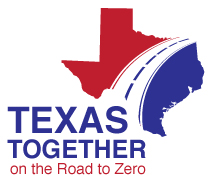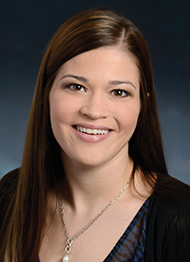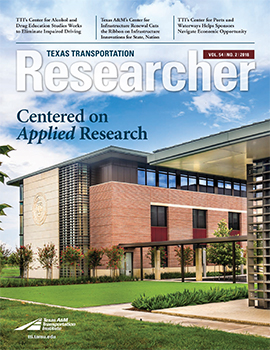With fatal and serious-injury crashes on the rise, the work of the Texas A&M Transportation Institute’s (TTI’s) Center for Transportation Safety (CTS) is more critical than ever.
“We’ve seen a steady increase in crashes over the last five years in Texas. A large part of this is due to the economy being better: we’re driving more, and in particular, higher-risk drivers like young people between 18 and 24 are driving more,” explains TTI Senior Research Engineer Robert Wunderlich, center director. “At CTS, we’re researching and implementing strategic solutions to reduce risks for all users of the transportation system.”

CTS was created in 2001 to focus on traffic safety research, policy analysis, education and outreach in Texas. The center has leveraged its annual appropriation of $1 million in state funds to secure total annual funding in excess of $6 million. Some of the center’s most notable research contributions as a champion of traffic safety include the following.
Thought Leadership in Traffic Safety
Working with the University of Michigan Transportation Research Institute on a project funded by the National Cooperative Highway Research Program, CTS examined the primary factors related to the significant decrease in fatalities in the United States from 2005 to 2011 and why fatalities are rising again. Findings providing new insight into major factors impacting traffic safety risks have been well received. What began with Wunderlich serving as a panel speaker at the Governor’s Highway Safety Association Annual Meeting has developed into an oft-requested keynote presentation at six state traffic safety conferences around the country.
Vehicle-Human Interaction
Leading the TTI team recently selected by the National Highway Traffic Safety Administration for an indefinite delivery indefinite quantity contract, CTS will evaluate how vehicle-based systems affect driver behavior and performance by examining deployment of new in-vehicle technology, evaluating options, and identifying potential safety issues. Researchers will look at crash-avoidance systems, how crash risk is affected, what system performance requirements should be implemented, and how to predict system effectiveness.
Cutting-Edge Techniques
CTS is developing new research techniques by exploring data mining of written narratives, using systems modeling to determine countermeasure potential, understanding the role traffic crashes play in occupational safety, developing apps and positive reinforcement to discourage distracted driving, and exploring how demographic characteristics relate to traffic crashes.
Outreach Efforts Targeting Specific At-Risk Populations
Center researchers lead outreach efforts like the Texas Motorcycle Safety Coalition, the Texas Impaired Driving Task Force, and the Pedestrian Safety Task Force. CTS’s Youth Transportation Safety Program targets some of the most vulnerable road user populations — pre-teens, teens and young adults — and includes the award-winning Teens in the Driver Seat® program implemented in 38 states.
Behavioral Trends Research
Each year researchers conduct statewide surveys examining traffic safety culture and Texans’ use of occupant protection, cell phones, attitudes and awareness, and provide the data to other professionals and the public. Results help track behavioral trends of Texans related to safety.
Implementation of Texas’ Strategic Highway Safety Plan

Partnering with the Texas Department of Transportation, CTS is engaging Texans to develop and implement the new Texas Strategic Highway Safety Plan. Branded Texas Together on the Road to Zero, this effort aims to reduce traffic-crash risks in the state involving impairment, distraction, speeding, pedestrians, intersections, road and lane departures, and older road users.
“Each day in Texas, 12 people are killed in traffic crashes, and that number is absolutely unacceptable. Safety research is an essential piece of the equation in bringing that number down. The work we do here at the center is focused on bringing Texas together on the road to zero traffic deaths,” says Wunderlich.


